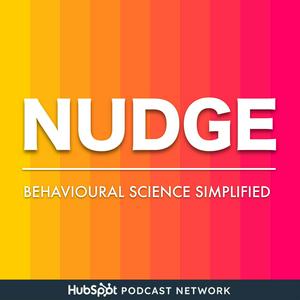16 years ago a chain of Chinese restaurants wanted to increase sales without changing the price.
They didn’t change the product.
The service.
The chef.
The food.
Instead, they changed two words on their menu and increased sales by 18%.
The restaurants used the advice of today’s guest on Nudge, Robert Cialdini.
Today, Cialdini explains the social proof principle, sharing how changing just two words could increase your sales.
---
Unlock the Nudge Vaults: https://www.nudgepodcast.com/vaults
Read Cialdini’s bestseller Influence: https://amzn.to/4prHb7Y
Read the new and expanded Influence: https://amzn.to/43TY0jI
Read Pre-Suasion: https://amzn.to/48hA6Qr
Read Yes! (Containing 60 Psyc-Marketing Tips): https://amzn.to/48ddNNf
Join 10,428 readers of my newsletter: https://www.nudgepodcast.com/mailing-list
Connect on LinkedIn: https://www.linkedin.com/in/phill-agnew/
---
Today’s sources:
Aune, R. K., & Basil, M. D. (1994). A relational-obligations approach to fund-raising: The effects of guilt and credibility appeals on compliance. Communication Research, 21(4), 486–498.
Binning, K. R., Kaufmann, N., McGreevy, E. M., Fotuhi, O., Chen, S., Marshman, E., Kalender, Z. Y., Limeri, L. B., Betancur, L., & Singh, C. (2020). Changing social contexts to foster equity in college science courses: An ecological-belonging intervention. Psychological Science, 31(9), 1059–1070.
Boh, W. F., & Wong, S.-S. (2015). Managers versus co-workers as referents: Comparing social influence effects on within- and outside-subsidiary knowledge sharing. Organizational Behavior and Human Decision Processes, 126, 1–17.
Borman, G. D., Rozek, C. S., Hanselman, P., & Destin, M. (2019). Reappraising academic and social adversity improves middle school students’ academic achievement, behavior, and well-being. Proceedings of the National Academy of Sciences of the United States of America, 116(33), 16286–16291.
Cai, H., Chen, Y., & Fang, H. (2009). Observational learning: Evidence from a randomized natural field experiment. American Economic Review, 99(3), 864–882.
Frank, R. H. (2020). Under the influence: Putting peer pressure to work. Princeton University Press.
Goldstein, N. J., Cialdini, R. B., & Griskevicius, V. (2008). A room with a viewpoint: Using social norms to motivate environmental conservation in hotels. Journal of Consumer Research, 35(3), 472–482.
Hallsworth, M., List, J. A., Metcalfe, R. D., & Vlaev, I. (2017). The behavioralist as tax collector: Using natural field experiments to enhance tax compliance. Journal of Public Economics, 148, 14–31.
Jung, J., Busching, R., & Krahé, B. (2019). Catching aggression from one’s peers: A longitudinal and multilevel analysis. Social and Personality Psychology Compass, 13(4), e12440.
Linder, J. A., Meeker, D., Fox, C. R., Friedberg, M. W., Persell, S. D., Goldstein, N. J., Knight, T. K., Hay, J. W., & Doctor, J. N. (2017). Durability of benefits of behavioral interventions on inappropriate antibiotic prescribing in primary care: Follow-up from a cluster randomized clinical trial. JAMA, 318(14), 1391–1392.
Meeker, D., Linder, J. A., Fox, C. R., Friedberg, M. W., Persell, S. D., Goldstein, N. J., Knight, T. K., Hay, J. W., & Doctor, J. N. (2016). Effect of behavioral interventions on inappropriate antibiotic prescribing among primary care practices: A randomized clinical trial. JAMA, 315(6), 562–570.
Murrar, S., Campbell, M. R., & Brauer, M. (2020). Exposure to peers’ pro-diversity attitudes increases inclusion and reduces the achievement gap. Nature Human Behaviour, 4(9), 889–897.
Nolan, J. M. (2021). Social norm interventions as a tool for pro-climate change. Current Opinion in Psychology, 42, 120–125.
Peterson, R. A., Kim, Y., & Jeong, J. (2020). Out-of-stock, sold out, or unavailable? Framing a product outage in online retailing. Psychology & Marketing, 37(4), 535–547.


